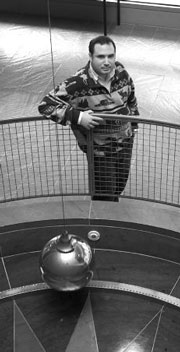|

Guillermo Gonzalez
is an Assistant Research Professor of Astronomy at Iowa State University,
He received his Ph.D. in Astronomy in 1993 from the University of Washington.
He has done post-doctoral work at the University of Texas, Austin and
at the University of Washington and has received fellowships, grants and
awards from such institutions as NASA, the University of Washington, Sigma
Xi (scientific research society) and the National Science Foundation.
Dr. Gonzalez has extensive
experience in observing and analyzing data from ground-based observatories,
including work at McDonald Observatory, Apache Point Observatory and Cerro
Tololo Interamerican Observatory. He has also published over sixty articles
in refereed astronomy and astrophysical journals including Astronomy and
Astrophysics, Monthly Notices of the Royal Astronomical Society, Astrophysical
Journal and Solar Physics. His current research interest in astrobiology
focuses on the "Galactic Habitable Zone" and captured the October
2001 cover story of Scientific American.
Another area of his
research is focused on analyzing and interpreting ground-based photometric
and spectroscopic observations of low and intermediate mass stars in relation
to current theories concerning the late stages of stellar evolution and
the formation and evolution of planetary systems.
|
|
Guillermo Gonzalez

|
Book:
The Privileged Planet |

|
Video:
The Privileged Planet |
 |
|
ARN YouTube Channel
The Privileged Planet
A lecture with Guillermo Gonzalez and Jay Richards |
Articles
Miscellaneous
|

